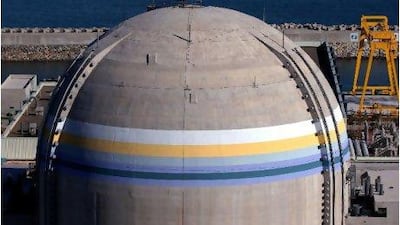The government company charged with building the UAE's nuclear reactors is opening its first formal dialogue with the public in the capital since the disaster at the Fukushima Daiichi atomic plant in north-east Japan.
Video: ENEC opens up for talks about UAE's nuclear plans
Last Updated: June 16, 2011 UAE
Enec, the UAE's nuclear energy company, will be talking to the public tonight for the first time since the disaster at the Fukushima nuclear plants in Japan, addressing concerns about UAE's plans to go ahead with nuclear energy.
The chief executive of Emirates Nuclear Energy Corporation (Enec) will tonight address concerns members of the public may have following the Japanese plant's partial meltdown and radiation contamination after a tsunami and earthquake hit the country in March.
The UAE's nuclear officials have taken a cautious approach so far in communicating with the public in the past three months, and the town hall meetings - where Fukushima is listed on the agenda - represent a willingness to talk.
"You cannot succeed in this endeavour without very strong public information and communication," John Loy, the radiation safety director of Federal Authority for Nuclear Regulation (FANR), said at the nuclear watchdog's first press conference yesterday since before the accident in Japan.
The UAE, which has embarked on a US$20 billion (Dh73.46bn) plan to build four reactors in the Western Region that are expected to produce up to a quarter of Abu Dhabi's electricity, is intent on making the case for nuclear power even as other nations, such as Germany, abandon it in the wake of Fukushima.
Italy became the latest country to bow to popular distrust of nuclear energy this week. More than 94 per cent of voters rejected the construction of new nuclear reactors in the country, undoing years of work in building public support for reintroducing atomic energy generation there. Italy had pulled back from nuclear power after the disaster at Ukraine's Chernobyl plant in 1986.
Germany last month agreed to phase out all of its 17 nuclear plants in response to Fukushima. Switzerland is due to phase out its five plants by 2034. Even Japan is looking to drill more wells for geothermal energy to reduce its reliance on nuclear.
The reluctance in those nations to pursue nuclear power illustrates a widening gap between them and the Middle East, where Saudi Arabia and Jordan have been paving the way for nuclear programmes through political agreements. The UAE has not announced any changes to its plans.
"The problem is not so much Fukushima itself, but the German decision. Germany is a number-one economy in Europe, and that could have a ripple effect on the future of nuclear in Europe," said Ian Jackson, an associate fellow at Chatham House, a think tank in London. "Various prospects remain very strong in the Middle East. They have the economic power to develop the plants, the political will, the necessity to do so," he said.
About 120 people turned out on Tuesday night for a briefing from Mohamed al Hammadi, the chief executive of Enec, and nuclear engineers in Madinat Zayed in the Western Region. The proposed site for the UAE's nuclear plant, which is under review by the FANR, is in the town of Braka, about 270km from the capital. Enec, which is awaiting the results of a public opinion study it commissioned last month, is scheduled to address Abu Dhabi residents tonight at Adnec, the exhibition centre.
"Once we explain the basics and the difference between geography and technology, and the added safety layers … people do understand that these are two separate and different cases," said Fahad al Qahtani, the acting director for external affairs and communication at Enec.
"We know that the general public has a positive perception of the nuclear project in the UAE, and we know that they have a fairly good understanding of the project. It's positive, it's supportive, and we're happy."

